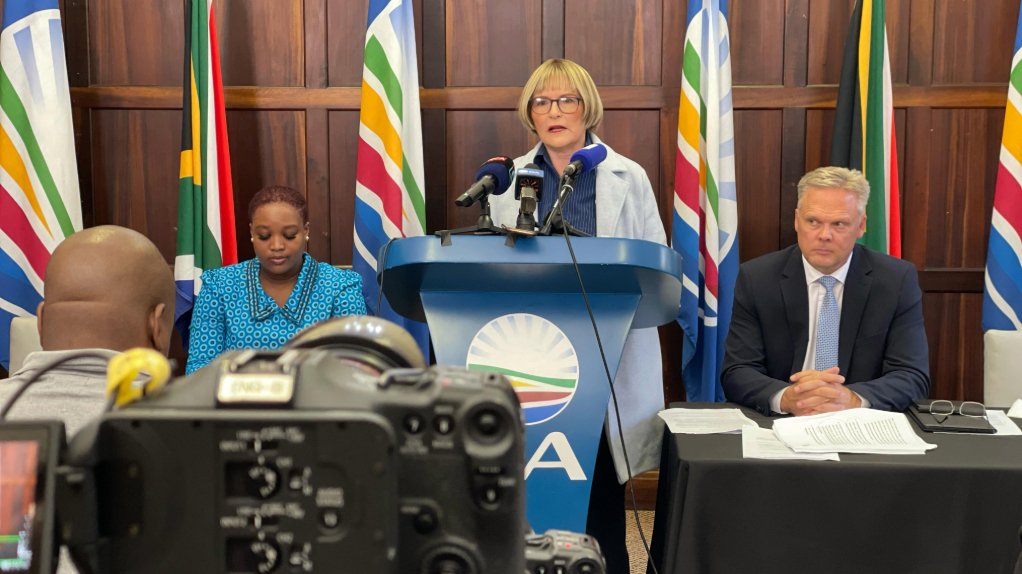South Africa’s ruling alliance is unlikely to see out its current five-year term, with internal party dynamics set to test its cohesion, a senior politician who helped negotiate the coalition’s operating framework has warned.
The African National Congress (ANC) teamed up with the Democratic Alliance (DA), its biggest rival, and eight smaller parties last year after losing the parliamentary majority it had held for three decades. The so-called government of national unity has weathered a series of crises, with its main members sparring over tax policy and the adoption of contentious land-expropriation, health insurance and education legislation.
“I’m not confident that it will last until 2029,” Helen Zille, the chairperson of the DA’s federal council, said of the GNU. “There has got to be a change of ANC leadership before then, in 2027, and there are a whole lot of people in the ANC who don’t want it to last,” she said in an interview in Bloomberg’s Johannesburg office.
One of South Africa’s most seasoned and outspoken politicians, Zille was part of a DA team that helped hammer out the broad terms under which the multi-party administration should function. She previously served as the mayor of Cape Town and premier of the surrounding Western Cape province, and is running for mayor of Johannesburg in municipal elections that must be held by January 2027.
The ANC led the fight against apartheid rule and took power in the country’s first multiracial elections in 1994. Its support plummeted during President Jacob Zuma’s nine-year tenure, which was marred by a series of corruption scandals, and he was eventually forced from office in 2018.
Incumbent President Cyril Ramaphosa has struggled to turn the ANC’s fortunes around, although it remains the country’s largest political party.
The current frontrunners to replace him as ANC leader are his deputy Paul Mashatile and Fikile Mbalula, the party’s secretary-general. Neither have declared their candidacy — or specified whether they will remain committed to the GNU, which has prioritised growing the economy and creating jobs.
The ANC’s new leader — if they decide against staying in the GNU — could opt to tie up with Zuma’s uMkhonto weSizwe Party or Julius Malema’s Economic Freedom Fighters, both of which want mines and banks to be nationalised.
That prospect would spook investors and likely derail a surge in South African assets that has seen the rand strengthen 9% against the dollar this year and local-currency bond yields fall to record lows. While the gains have been helped by the dollar weakening — and are part of a broader emerging market rally — they are also down to investors viewing the GNU as broadly stable, at least for now.
Zille dismissed the notion that it will be a struggle for a White person to be elected mayor of Johannesburg, the country’s economic capital and which has a predominantly Black population. Dogged by years of mismanagement, the city of more than 5-million people has a huge infrastructure backlog and residents have to contend with regular water and electricity cuts, potholed roads and broken traffic lights.
“Yes, the elites are very stuck on race, but actually ordinary people want water and ordinary people want electricity at affordable prices and they want to be able to put a vehicle on the roads without destroying it,” she said.
True to her combative form, Zille lambasted the ANC, saying corruption had been institutionalised under its watch.
“They are morally bankrupt and morally bereft, and more the world can see that the better,” she said. “It’s rotten from top to bottom and corrupt.”
Ramaphosa concedes that graft is a major problem, but says his administration is tackling the issue head-on.
Zille also accused the government of mishandling its relationship with US President Donald Trump, who has falsely accused South African authorities of subjecting White farmers to a genocide and seizing their land. Young Black men in fact bear the brunt of crime in South Africa, and there have been no official land grabs since apartheid ended.
“I don’t think anybody in South Africa said there’s a White genocide,” Zille said. But farmers and their workers have “been targeted for particularly grim treatment,” she added.
It was also true the country’s Black economic empowerment laws that were meant to address inequalities stemming from apartheid had enriched a tiny elite and discriminated against minorities, Zille said.
EMAIL THIS ARTICLE SAVE THIS ARTICLE FEEDBACK
To subscribe email subscriptions@creamermedia.co.za or click here
To advertise email advertising@creamermedia.co.za or click here











